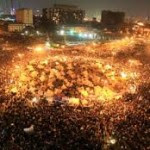You might aphorize the difference in Egypt between the Army and Morsi’s Muslim Brotherhood this way: the army feels it has to behave legitimately because it wasn’t elected while Morsi felt he could behave imperviously because he was elected. In this, Egypt exhibits a dialectical process that fits a global pattern. The world is now full of leaders who choose to rule unilaterally because, by one means or another, they got more votes than others. Putin set the example and others followed, not least Turkey’s Prime Minister Erdogan. Conversely, China’s Communist Party leaders know they have to keep the public satisfied year after year or they will face upheavals over legitimacy. As things stand, every instance of chaos in democratic countries gives them propaganda fodder.
Most commentators don’t seem to have grasped the fact that the old equations of democracy, stability and prosperity don’t compute so smoothly anymore, not since the advent of two new factors: globalization and social media. (One pundit who does ‘get’ it is Charles Moore, Margaret Thatcher’s biographer and Daily Telegraph columnist, who keeps invoking the slogan “everything has changed”.) No one worries about how to decipher the Brave New World we inhabit nor the challenge to our old values and nostrums. Consider the crowds in Tahrir and Gezi and Sao Paolo: they know the world is watching; they know of each other and they know their own instant momentum through twitter. They represent a new kind of global simultanaeity. But are they always on the side of right? Two years ago in Tahrir they blew away Mubarak’s decades-long secular dictatorship and ushered in the regressive Muslim Brotherhood. Now they want Morsi gone. Among the commentariat, nobody questions Tahrir’s legitimacy. Yet, Morsi’s party did win an election, Egypt’s first. Who elected the people in Tahrir?
I say this as a dyed-in-the wool political secularist, a long-time critic of Erdogan in Turkey and Putin in Moscow – Putin, who has evinced such a new-found statist reverence for the Russian Orthodox church. Like most people, I bear no love for dictators, self-appointed or elected. But while all my colleagues in the global press cheered on Erdogan’s elections, Mubarak’s overthrow and Gaddafi’s demise, none seemed to worry about the consequences. What about the region’s barely contained dangerous animosities? Such things were overlooked by the intoxicated optimism of Western reporters. To them, democracy was a self-fulfilling prophecy. Thousands of deaths and rapes and acts of arson and robbery later, they have realized that in Egypt as elsewhere plebiscites do not a democracy make, and democracy sans rule of law can be worse than dictatorship. Where are their mea-culpas now?
One way in which everything has changed is that history, ancient history, has come back with a vengeance. Hitherto marginalized masses with deeply dubious, long-suppressed urges of sectarianism, extreme patriarchy or tribalism can now link up across countries and continents. Hence the spread of Wahhabism and Shiite solidarity. Hence the strife in Syria and Mali. Suddenly we’re back in the twelfth century with a borderless Islam. Hence, in reaction, the coup now happening in Egypt. There’s a millenium-long precedent for that dialectic in the region: mobs overthrow the ruler, chaos ensues, iron-fisted rulers return with crowds applauding. Anyone asserting that history equals destiny for any region will soon be driven out of polite society as a bigoted cynic. But ignoring history merely allows predatory populists to exploit it.
Here’s some salient history. In the Ottoman Empire ‘s Tanzimat or reformation era (1839 – 1876) which included Egypt and much of the Middle East, homosexuality was decriminalized, secular laws instituted, slavery abolished, ethnic and religious discrimination prohibited. A constitution was drafted limiting the Sultan’s powers and an elected parlaiment planned. Sadly, at the eleventh hour, the Sultan and his advisers realized that they couldn’t make it happen. All their hard work of modernizing and westernizing would evaporate the minute the people elected their representative assembly – full of devout imams. A hundred and fifty years later, Egypt voted in the Muslim Brotherhood.
As for the MB, they too have been around a long time. Since the 1920′s they have resisted one ruler after another – the British, King Fouad, Nasser, Sadat, Mubarak. They’re not about to go away. They’ve assassinated liberally and been liberally suppressed down the decades. They have consistently worked to keep women and Copts out of government. But their roots go back down the centuries to secret societies that flourished in the Ottoman Empire of Alawites, Arab Nationalists, Armenians, Janissaries, Serb and Bulgarian nationalists, Freemasons and the like, many of which were in turn modelled on Medieval professional guilds. The MB’s genius for organizing meant they functioned very effectively as a civic network distributing food, medicine, ideas. But always within their own ambit, albeit a steadily widening one. They simply do not know how to serve a diverse population or how to compromise on lines of inclusion on a national scale. Which is partly why Morsi has ruled ineptly and one-sidedly since he took power. His people believe in Islamic supremacy, even efficiency, and even a kind of Islam-dominated tolerance. They couldn’t deliver it. Ultimately, it wasn’t going to fit the needs of a modern democracy anyway, however incrementally they proceeded, as Erdogan tried to do in Turkey.
Egypt has run out of elegant solutions. Your bien pensant pundits deluded themselves, and you the reader, in assuming it could turn out otherwise. At least in the short run, through a mere political revolution. The Middle East has taught us that more than money, elections, or religious freedoms, culture matters. Until we all get into the business of countering the Muslim Brotherhood and its ilk from the ground up, through a serious battle over ideas from childhood onwards, not much will change.

No comments:
Post a Comment